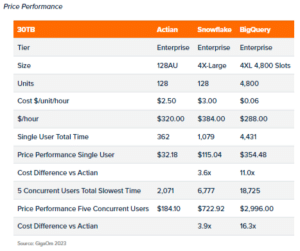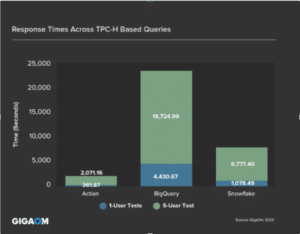The Actian Data Platform’s Superior Price-Performance
Phil Ostroff
December 27, 2023

When it comes to choosing a technology partner, price and performance should be top of mind. “Price-performance” refers to the measure of how efficiently a database management system (DBMS) utilizes system resources, such as processing power, memory, and storage, in relation to its cost. It is a crucial factor for organizations to consider when selecting a DBMS, as it directly impacts the overall performance and cost-effectiveness of their data management operations. The superior Data Management Platform, the Actian Data Platform, can provide the price-performance you’re looking for and more.
Getting the most value out of any product or service has always been a key objective of any smart customer. This is especially true of those who lean on database management systems to help their businesses compete and grow in their respective markets, even more so when you consider the exponential growth in both data sources and use cases in any given industry or vertical. This might apply if you’re an insurance agency that needs real-time policy quote information, or if you’re in logistics and need the most accurate, up-to-date information about the location of certain shipments. Addressing use cases like these as cost-effectively as possible is key in today’s fast-moving world. Key benefits of the Actian Data Platform include:
The Importance of Prioritizing Optimal Price-Performance
Today, CFOs and technical users alike are trying to find ways to get the best price-performance possible from their DBMS systems. Not only are CFOs interested in up-front acquisition and implementation costs, but also all costs downstream that are associated with the utilization and maintenance of whichever system they choose.
Technical users of various DBMS offerings are also looking for alternative ways to utilize their systems to save costs. In the back alleys of the internet (places like Reddit and other forums), users of various DBMS platforms are discussing how to effectively “game” their DBMS platforms to get the best price-performance possible, sometimes leading to the development of shadow database solutions just to try and save costs.
According to a December 2022 survey by Actian, 56% of businesses struggle to maintain costs as data volumes and workloads increase. These types of increases affect the total cost of ownership and related infrastructure maintenance, support, query complexity, the number of concurrent users, and management overhead, which have a significant impact on the costs involved in using a database management system.
Superior Price-Performance
Having been established over 50 years ago, Actian was in the delivery room when enterprise data management was born. Since then, we’ve had our fingers on the pulse of the market’s requirements, developing various products that meet various use cases from various industries worldwide.
The latest version of the data management platform, the Actian Data Platform, includes native data integrations with 300+ out-of-the-box connectors and scalable data warehousing and analytics that produce REAL real-time insights to more confident support decision-making. The Actian Data Platform can be used on-premises, in the cloud across multiple clouds, and in a hybrid model. The platform also provides no-code, low-code, and pro-code solutions to enable a multitude of users, both technical and non-technical.
The 2023 Gigaom TCP-H Benchmark Test
At Actian, we’re really curious about how our platform compared with other major players and whether or not it could help deliver the price-performance being sought after in the market. In June of 2023, we commissioned a TCP-H Benchmark test with GigaOm, pitting the Actian Data Platform against both Google Big Query and Snowflake. This test involved running 22 queries against a 30TB TCP-H data set. Actian’s response times were better than the competition in 20 of those 22 requests. Furthermore, the benchmark report revealed that:
- In a test of five concurrent users, Actian was overall 3x faster than Snowflake and 9x faster than Big Query.

- In terms of price-performance, the Actian Data Platform produced even greater advantages when running the five concurrent user TPC-H queries. Actian proved roughly 4x less expensive to operate than Snowflake, based on cost per query per hour, and 16x less costly than BigQuery.

These were compelling results. Overall, the GigaOm TCP-H benchmark shows that the data management platform, the Actian Data Platform, is a high-performance cloud data warehouse that is well-suited for organizations that need to analyze large datasets quickly and cost-effectively.
Actian customer, the Automobile Association (AA), located in the United Kingdom, was able to reduce their quote response time to 400 milliseconds. Without the speed provided by the Actian Platform, they wouldn’t have been able to provide prospective customers the convenience of viewing insurance quotes on their various comparison pages, which allows them to gain and maintain a clear advantage over their competitors.
Let Actian Help
If price-performance is a key factor for you, and you’re looking for a complete data platform that will provide superior capabilities and ultimately lower your TCO, do these three things:
- Contact us! One of our friendly, knowledgeable representatives will be in touch with you to discuss the benefits of the Actian Data Platform and how we can help you have more confidence in your data-driven decisions that keep your business growing.
- Check out our technology solutions.
Subscribe to the Actian Blog
Subscribe to Actian’s blog to get data insights delivered right to you.
- Stay in the know – Get the latest in data analytics pushed directly to your inbox.
- Never miss a post – You’ll receive automatic email updates to let you know when new posts are live.
- It’s all up to you – Change your delivery preferences to suit your needs.
Subscribe
(i.e. sales@..., support@...)


















